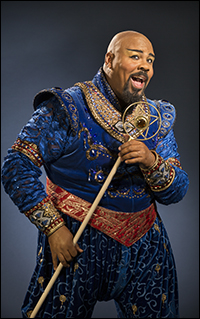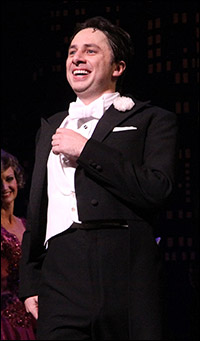
*
Last season, Tara Rubin — who leads Tara Rubin Casting (which also includes casting directors Eric Woodall, Merri Sugarman, Kaitlin Shaw, Lindsay Levine and Scott Anderson) — cast the Tony Award-nominated Broadway productions Mothers and Sons, Aladdin and Les Misérables as well as Bullets Over Broadway, A Time to Kill and Big Fish.
Her casting credits also include Scandalous: The Life and Trials of Aimee Semple McPherson; The Heiress; Ghost The Musical; One Man, Two Guvnors; Peter and the Starcatcher; Jesus Christ Superstar; Hugh Jackman, Back on Broadway; How to Succeed in Business Without Really Trying; Promises, Promises; A Little Night Music; Guys and Dolls; Shrek the Musical; Billy Elliot: The Musical; Glory Days; The Country Girl; The Little Mermaid; The Farnsworth Invention; Young Frankenstein; The 25th Annual Putnam County Spelling Bee; The Producers; and more.
Tara Rubin Casting also casts for the long-running musicals The Phantom of the Opera, Mamma Mia! and Jersey Boys.
Rubin answered Playbill.com's questions, via email, on auditioning for long-running shows, how to present oneself in the audition room, callback pitfalls and more. For more information, visit her page at the Playbill Vault. You've cast long-running shows including The Phantom of the Opera, Jersey Boys and Mamma Mia! What do you look for in actors coming in for a long-running show? Someone to fit the mold? Fresh, raw talent? What advice can you give an actor going in for one of these productions?
Tara Rubin: On long-running shows we look for actors who can continue to portray the characters the way they were originally conceived. For instance, to play Christine Daaé in Phantom of the Opera you must be able to sing the score as written. But, we are always interested in making sure the characters remain lively and vivid — we aren't looking to replicate or duplicate, but rather for actors who are capable of playing the role and who inhabit the role with their own humanity and personality without changing the music or the text.
You recently cast the current Broadway revival Les Misérables (which has been re-imagined and deviated from typical casting choices). What do you suggest for an actor going in for a well-known show? To simply present the best version of themselves or to really prepare based on what they know? How prepared is too prepared?
TR: I really don't think there is such a thing as "too prepared." Preparation is the spine in the audition — it will keep the actor standing upright when nerves or something unexpected happens in the audition room. But, we want to see a living, breathing human being in the audition — not someone who has prepared technically and rigidly. We want to see your ideas about the characters.
What has changed about the casting process for shows such as Les Miz and Phantom? Are the demands different than they were before? We're also seeing a lot more multi-racial casting…
TR: It is truly wonderful to be able to present a diverse cast for these well-known shows. I am thrilled that actors of different ethnic backgrounds are interested in being in these shows. As far as the casting process changing — I do think we have come to expect cast in the sung-through shows to be excellent actors as well as singers. It's not enough to be able sing the score beautifully — there is an emotional and personal journey that all of the characters take in these shows, and the creative teams expect to see an actor's ability to do that in the audition room.
 |
||
| James Monroe Inglehart in Aladdin |
||
| Photo by Cylia von Tiedermann |
TR: I love dance auditions. I love dancers — some of my favorite casting memories are of dance auditions. One thing that I have noticed over the years is that the creative teams respond to the dancers who focus and work hard more than the performers who call attention to themselves and try to stand out. We love the folks who concentrate and make an effort — even if the choreography is very challenging to them. It's best to stand out and be noticed for your talent. People who don't pay attention and are looking at themselves in the mirror instead of listening are noticed for that, not their dance ability. You've also cast for film and movie musicals. What are some pitfalls musical-theatre actors face when going in for film?
TR: We don't cast a lot of films or TV, but we cast a lot of plays. "Musical-theatre" has become a derogatory comment — which drives me crazy. People use the term to mean "broad acting," I think. Ramin Karimloo and Zach Braff are both doing musical theatre on Broadway right now, and their performances are superbly acted, detailed and smart. I think actors who are accustomed to auditioning for musicals would do well to remember that characters who don't sing and dance have to be created by words alone. The actor needs to use the language with precision and thought. I like actors to make a lot of decisions about the sides — just making the words your own and the scene sound natural isn't enough. We expect a strongly developed sense of the scene in the audition room — not a general wash of feelings.
Should one submit or go in for an audition although they may not be right for it? What about non-Equity actors going to EPAs?
TR: Non-Equity actors should always go to EPAs. We have stories! I would say if an actor is completely wrong for a role, it can be annoying for him to show up at an audition. But, an open call is an open call, and I understand why actors want to take advantage of the opportunity to be seen. We are always thinking about all our shows — so an actor who isn't right for the particular show might be right for something else. And, showing up that day is a good way to remind us that you are in town and ready to work.
Talk about presenting yourself and dressing for an audition. How much is too dressed? What is underdressed? And, if an actor is auditioning for a part in say… Mamma Mia! how far '70s could/should you go?
TR: I always think an actor should look his best and dress toward a role. If you are auditioning for the role of Ophelia, you don't need to braid dead flowers into your hair, but perhaps not jeans and sneakers? Dress toward the character to help yourself get closer to the role. I also think you don't want to dress in clothes that are outrageous or distracting — we want to remember the actor not the dress.
Talk about first impressions. What are you taking note of when an actor enters the room?
TR: People who can be relaxed and just get on with the audition impress me. I'm not a fan of people who walk in "in character" or who rush the table to shake hands. The actor should take his cue from the person who greets him: If he is being introduced that will be clear, and then a handshake and "Nice to meet you" is appropriate. If not, it's best to take you place in the room and get started. You don't need to introduce yourself or your song in my auditions. We do everything we can to make the room comfortable and the actor welcome. Listen, and be aware of the tone of the room — acting has a lot to do with intuition, so let us see that you have taste and discretion.
 |
||
| Zach Braff in Bullets Over Broadway |
||
| Photo by Joseph Marzullo/WENN |
TR: I'm not a fan of riffing unless the score or character requires it. I'm not a fan of showing off unless the character shows off. If a director says, "Please riff and show off," go for it! Although a song is overdone, would it still be okay to perform if you sing it well?
TR: Yes, depending on the situation. An actor should know when it is appropriate to sing music from the score of the show being cast. (We will tell you.) Have songs in your book that you love to sing.
Can you talk about headshots and resumes? What are some dos and dont's you have seen in the audition room? Can you give actors some pointers on the best way to present themselves?
TR: I'm not all that interested in headshots. As long as your photo represents you as you look on the day of the audition, it's fine with me. People have been putting little clips of their reviews on resumes. Not sure that's necessary! When you come into the audition room, try to be your best self — not super formal, but not too casual either. Don't act like we go out for drinks together — but don't act like you've been called into the principal's office. Turn off your cell phone!
Do you put more weight on actors who have appointments through representation or have high-profile managers?
TR: I'm interested in the actor, not his representation.
Following a successful initial audition, what are some common mistakes you see actors make during a callback?
TR: Some actors change what they did in the first audition too much. It's as if they think they need to come up with a new approach. Usually we are looking for further development of what you presented the first time. Try to listen and be present for notes and comments — here's where your preparation comes in: You want to know the material well enough that you can really work on it if the director has adjustments. Sometimes the director just needs to see you again to seal his memory of you. I was always taught that the only answer to a note is "Thank you." If you receive an adjustment try to do it — don't defend the choice you made or explain why you did it.
How beneficial is it to have your sides memorized for a callback?
TR: I think actors should be as memorized as possible and hold their pages to help out. We don't expect you to be off book — but the better you know the material the easier it will be for you to work in the room. (Playbill.com staff writer Michael Gioia's work appears in the news, feature and video sections of Playbill.com as well as in the pages of Playbill magazine. Follow him on Twitter at @PlaybillMichael.)









